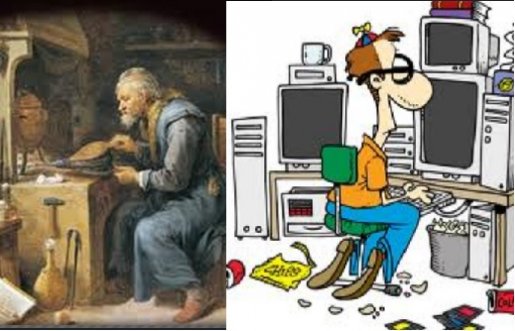The 21st Century Canterbury Tales


People in the Middle Ages were of the same nature as people today; only the form of life was different.
In Chaucer's Canterbury Tales, all the characters are common people. The tales are the same escapades people tell each other in pubs or at parties nowadays. Sometimes, they share their experiences or the experiences of their friends in order to point out to an injustice in the society ("the old man was lying on the street for two hours, but no one would help him, some kids stole his watch and wallet though, of course").
Sometimes they ponder over money and ways to cash in. In the Middle Ages, people were obsessed with gold, as clear in the story about an alchemist. It reminds me of bitcoin - open source electronic money. Modern alchemists spend their days behind computers, trying to discover the secret formula.
From the Canterbury Tales' narrative we also learn a lot about different countries and cultures. Some stories take us to Arabian Nights (by the flying carpet), where life was very different from Christian Europe. Almost like the stories we hear from friends who return home from a holiday in Dubai (except now they use Emirate Airlines). As Europeans they find they can hardly enjoy an all-inclusive break if the women have to be cloaked and you can't hold their hand, plus you can't even get a bottle of wine.
On the other hand, some of the story-tellers only want to boast about their achievements or mock society in general. The Miller's tale is about a woman who is married to an old carpenter, but cheats on him with a young scholar and passers-by. Actually, she is a medieval example of a gold-digger - although in a different sense than to the alchemist.
Chaucer Today
Chaucer was clever enough not to drink too much while sitting in the inn where the characters told their stories. Rather to jot down stories like these. He worked as a clerk and diplomat, and therefore was familiar with human nature. Moreover, he wrote in vernacular English and his stories could be heard by the masses.
At that time, hardly anyone could read or afford a book, but that was gradually changed thanks to education and printing. Chaucer was a kind of paparazzi who wrote about infamous people for people who could not read.
It reminds me of today's celebrities who release autobiographies even before they learn to write for fans who cannot read. They hope to be famous one day like the characters from The Canterbury Tales.
Thanks to their self-promotion through the stories, they became part of the cultural heritage of the English language. In doing so, they earned Geoffrey Chaucer the nickname "the father of English literature".
Erik Redli is a university graduate from Slovakia who lived in London for much of his graduate life. Read more of his posts here.








